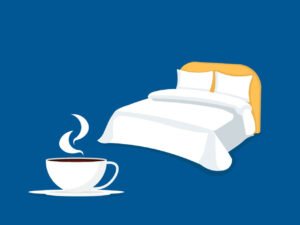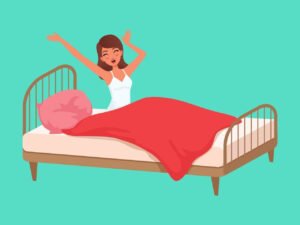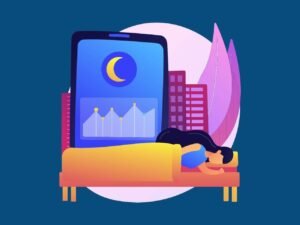Getting up on time in the morning can be a challenge for many people, and it is all too easy to smash that snooze button and roll back over, but it won’t do you any favors.
Not only will you have less time to get ready for wherever you need to go, but you will also most likely end up feeling even more tired.
And even if you know all of this to be true, it can be difficult to put it into practice at the moment.
Read on to find out how to wake up on the first alarm, so you never have to have a bad morning again.

Contents
What Is a Sleep Cycle?
Before we start talking about alarms, we need to understand a little bit about sleep cycles.
It can be easy to think that we just shut down for the night when we go to sleep.
But sleep is actually a very active process with your brain and body going through changes throughout the night.
There are four main sleep cycles, and you go through each of them multiple times each night.
Stage 1
It takes you from being awake to being asleep. This stage lasts for a few minutes and is a light stage of sleep from which it is easy to awaken.
It is characterized by:
- Heartbeat and breathing are slowing down
- Muscles relaxing
- Brain waves slowing down
Stage 2
It is the sleep stage before the deep sleep stage.
It is characterized by:
- Heartbeat and breathing rate slowing down even further
- Eye movements stopping altogether
- A drop in body temperature
- Brain waves slowing down
Stage 3
It is the deep sleep stage where your body heal.
It is characterized by:
- Heartbeat, breathing rate, and brain waves slowing down to their lowest levels
- Being difficult to wake up
Stage 4 – REM sleep
This is the REM sleep stage, and it is very different from the other three stages of sleep. You will experience REM sleep for the first time in the night, around 90 minutes after you fall asleep.
It is characterized by:
- Rapid eye movement
- brain waves that are active to levels that are similar to when you are awake
- Breathing rate being fast and irregular
- Heart rate and blood pressure being close to waking levels
- The highest level of dreaming
- Your body is paralyzed to stop you from moving around during your dreams
Sleep is still a mystery, and no one is sure exactly why we go through the sleep stages that we do. Still, we know that they are important for regulating hormones, memory, and learning, growth, appetite, and physical renewal.
We also know that not getting enough sleep can be harmful to our health.
Why Is It So Difficult To Get Up in the Morning?
If you struggle to get out of bed in the morning, there could be a few different reasons.
The most obvious is that you aren’t getting enough sleep.
Most adults need between 7 and 9 hours of sleep a night, but around a third of us aren’t getting enough.[1]
And it usually isn’t enough to try to catch up on sleep at the weekend.
You will still have a lot of the sleep debt that you have accumulated throughout the week.
It can take a few months to catch up if you have been chronically sleep-deprived fully.[2]
The technical term for waking up feeling groggy is “sleep inertia.”
It usually only lasts up to 30 minutes but can go on for as long as 2 to 4 hours, and it can seriously impact your ability to complete everyday tasks and make it more difficult for you to get out of bed.[3]
And if you do have sleep inertia, it can be oh so tempting to press that snooze button.
But trust us when we say that you shouldn’t.
Why Pressing Snooze Is Bad for You
While you might think that those extra few minutes in bed will leave you feeling less tired when you finally do wake up, pressing snooze can actually make your sleep inertia worse.
And this is because it interferes with where you are in your sleep cycle when you wake up.
As we have seen, your body goes through clearly defined sleep stages, each with different levels of deepness.
When you press snooze after being woken from your sleep cycle, you don’t drift straight back into the stage you were in when you woke up.
Instead, it triggers your body to restart the sleep cycle all over again, and this can mean that you are in a deeper stage of sleep when the alarm goes off a second time.[4]
Being dragged from a deep sleep stage makes your sleep inertia worse and will mean that you are even more tired than you would have been if you had just got up the first time.
It also means that you have less time to get ready when you finally get up, which can leave you feeling rushed and stressed and may mean that you miss those little self-care routines that can help set up your day properly.
So the best thing that you can do, even if you haven’t had enough sleep, is to avoid the snooze button and wake up on the first alarm.
And there are some tips and tricks that you can use to help you manage that.
How to Wake Up on the First Alarm
1) Get enough sleep
As we have alluded to, the easiest way of making yourself less tired in the morning (and making it easier to get up when your first alarm goes off) is to make sure that you are getting enough sleep.
There are some things that you can do to help you if you are struggling to get enough sleep:
- Have a consistent bedtime and awakening time.
- Have a warm bath before bed to help you to relax.
- Do some relaxation exercises, such as yoga or mindfulness.
- Read a book before you go to bed.
- Do not do any heavy exercise right before bed.
- Do not eat a heavy meal right before bed.
- Avoid looking at screens, such as smartphones, tablets, or computers for an hour or so before you go to bed. If you have to look at screens, wear Blue Light Blocking Glasses.
Keeping a sleep diary can help you keep track of the factors that might negatively affect your sleep.
2) Make your sleep environment sleep-friendly
It is important to make sure that your bedroom is conducive to sleep, and that means making it as sleep-friendly as possible.
Your bedroom should be for sleep or sexual activities only (sex can help to promote sleep) so that your brain and body associate being in bed with going to sleep.
To that end, you should:
- Avoid having any electronic equipment in your bedroom, including TVs and laptops that could weaken the association between your bedroom and sleep.
- Limit the amount of light that is emitted from any devices that you do have in your bedroom, including standby lights.
- Blackout blinds can help to reduce the amount of light coming in from outside.
- Make sure that your bed, mattress, and pillows are comfortable for you. They can make a big difference in how well you can get to sleep, and stay asleep. My favourite pillow is the Beckham Hotel Collection Bed Pillows.
- Have your bedroom at a comfortable temperature.
- Make sure that your bedroom is tidy to help you to relax.
3) Choose your alarm carefully
The type of alarm that you use can have a big impact on how able you are to get up at the first alarm.
So choosing an alarm that works for you is important.
Waking sounds
Research has shown that the type of alarm tone you use can help you to experience less sleep inertia.[3]
Specifically, melodic tones work better for waking you up more fully at the first alarm.
So choosing a musical alarm tone can help you to feel less tired when you wake up.
Artificial dawn
Our sleep cycle is closely linked with natural light.
Sunlight triggers the release of melatonin, which is the hormone your body uses to control your circadian rhythm and sleep.
One of the reasons many people don’t sleep enough is that we do not sleep according to the sun’s movements anymore.
The blue light that is present in our smartphones and computers, in particular, can interfere with our bodies’ production of melatonin.
One method of helping you get up in the morning is creating artificial dawn inside your bedroom.
It helps your body regulate its sleep cycle and can trigger the processes necessary to help you wake up with ease.
One study found that people who used artificial dawn had less sleepiness when they woke up and a quicker body activation (including faster changes in skin temperature).[5]
A dawn simulation can work as a natural alarm without sounds because the light can penetrate your eyelids, which will naturally wake you up.
You can usually buy them in the form of a lightbox that you keep next to your bed, and you can set the dawn to start at whatever time you want.
Novelty alarm clocks
Some slaves to the snooze button come up with inventive ways of forcing themselves out of bed.
This can include alarms that launch a little helicopter or rocket across the room that you have to go and find to turn it off.
Or alarms that are on wheels and scoot away so that you have to and chase them.
Or even alarms that make you complete an algebra problem before you can turn them off.
All of these types of alarm clocks work using the same principle – they force you to wake up to the point that you no longer want to go back to sleep.
And in that respect, they do often do their job.
But they may not be a long-term solution.
If you are suffering from sleep deprivation or have a sleep environment that is negatively affecting your sleep quality, it is still important to fix them even if you are forced awake by chasing your alarm clock around the house.
The Bottom Line
Pressing the snooze button doesn’t just make you late in the morning.
It can also be bad for your health.
Understanding how your sleep cycle works helps you learn how to wake up on the first alarm every time.
And you will feel less tired as you go about your day, which will make you happier and more productive.



